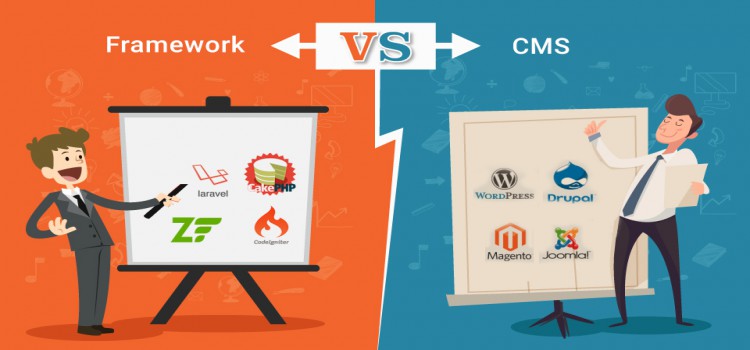Frameworks vs. CMS – Which One is Better and Why?

When doing a web development project, the most significant decision to make is which tools you should use to complete the task. It is always a tough decision for the developers to choose between Frameworks and Content Management System (CMS). Before picking one option, it is crucial to understand Framework vs. CMS and their role in website development.
If you are developing a website or an app, one of your first point of question can be Content Management System vs. Framework. Making the wrong choice can create many problems for your web project. Opting for Frameworks when all you need is a CMS is a recipe for wasted effort and time.
So, what is the difference between a Content Management System and a Framework? Here is some basic knowledge of web framework vs. cms.
Framework
A framework is a necessary software that provides generic functionality for reducing the amount of overhead in building your web project. Often, Frameworks provide interaction, authentication, and router model for delivering responses to web requests. Put merely; a Framework is a fundamental tool for building great solutions. The target audience of a framework is developers.
In PHP there are various Frameworks available. We have a collection of some popular PHP Framework Interview Questions are listed below:-
Content Management System (CMS)
A high-level software, a CMS enables the creation and management of content to be displayed on a web page or application. Usually, a CMS provides user management, authentication, page or blog manager, basic settings, etc. Because a CMS is a high-level software, there are lesser efforts required by the developer. In other words, lesser effort means reduced control, which means limited freedom.
In PHP there are various CMS available. We have a collection of some popular CMS Interview Questions are listed below:-
| Wordpress Interview Questions | SilverStripe Interview Questions | |
| Drupal Interview Questions | Joomla interview questions | |
Advantages of using a Framework
A useful framework will provide rapid deployment of most of your web project's features. It includes authentication, routing stack, dependency container, object-relational mapping for databases, and different support classes.
The goal of using a Framework is to give you a firm foundation for building up your web project, rather than writing it from scratch. This will help you save time and money. Also, a useful framework should also follow established programming standards such as SOLID / DRY principles.
Disadvantages of using a Framework
As such, there are no disadvantages, if you are not expecting any features that are not designed in Frameworks. In our opinion, Symfony and Laravel are two of the best options for an enterprise-ready, standards-based framework. Both of these Frameworks are extensible and versatile, which are said to be the best coding practices. Both of these Frameworks provide great value, and support packages to extend the framework-specific or agnostic packages.
However, the biggest downside of Frameworks is that they do not do enough to help you get control over your projects. This is where you have to prepare yourself to combine it with third-party packages.
Advantages of using a CMS
A good CMS provides the jumpstart that a Framework cannot do without hindering the positive aspects of the Framework itself. A CMS will not just provide you with the authentication (that Frameworks also provides), but you will also have complete user management.
A CMS will also provide routes and controllers (from the Framework) in addition to a page or a blog that can e routed automatically through the CMS. All that the developers need to do is point and click, and things will happen on their own! A CMS can provide almost everything that you need to build a website. You can consider purchasing or making the components required to fill in any gaps in your project. Having a solution that provides out-of-the-box features is an immense advantage when you are kick-starting a new project.
Disadvantages of using a CMS
There can be several problems of using a CMS, depending on how you want to look at it. To some developers, CMS may come across as too much clutter, insufficient underlying foundations, operational inconsistencies, poor code quality, not extensible which forces the developer to hack the files. Basically, CMS can be seen as software with poor design principles, and its execution can be a problem for some users.
So, web development framework vs. cms - which one will you use?
We would suggest a combined alternative. According to us, you should leverage both a framework and a CMS for your low-level and high-level requirements, respectively.
